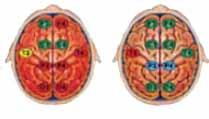
6 minute read
caRS go VEgaN

Visualize “Inside” The BrainWith NeuroMapping Technology Before After
Advertisement

10% Off Your First Session Just mention this ad

Neurofeedback can Improve or Eliminate Symptoms of
ADD/ADHD Addiction Autism Anxiety Bipolar Disorder Chronic Fatigue Depression Dyslexia Epilepsy Fibromyalgia Head Injury Insomnia Obsessive
Compulsive Disorder
Migraines PTSD/Stress ...and more
Cars Go Vegan Leather Interiors are on the Way Out

by Yvette C. Hammett
Consumers are becoming more a sustainable automaker. Mercedes Benz conscious about their purchases in and BMW are offering customers plantlight of the ongoing climate crisis based alternatives and Tesla has been dropexacerbated by animal-based agriculture. ping leather from its upholstery choices for As they begin to make better choices in a while now, with the Model 3 and Model what they consume, wear and drive, vegan Y already sporting vegan-only interiors. car interiors are becoming more popular. The Volvo Polestar 2 also comes standard The environmental impact of producing with vegan upholstery, along with recycled leather, foam and other materials is being wood. And the 2020 Range Rover Evoque, replaced in some instances by alternatives Velar and Jaguar I-Pace SUVs all offer that are becoming more readily available to consumers vegan interiors. environmentally conscious consumers. Research and development is ongo
The Toyota Prius line uses Sof-Tex ing in this realm to create faux leather that synthetic leather or other synthetic cloth not only looks good, but is actually more upholstery which bolsters its reputation as durable and easier to maintain than leather.

HOMEOPATHY Works with your Body for Whole Health, Healing and Prevention
Call to schedule your FREE 15-Min Consultation 817-847-0900 AbundantLifeWellnessCenter.com 3904 Boat Club Rd. • Lake Worth, 76135
Natural • Nontoxic • Holistic Healthy Healing Arts, LLC



Learn More! Contact: Cathy Lemmon 469-383-8442
HPWWC.org or visit: HealthyHealingArts.com Immunization Alternatives with Homeoprophylaxis
Vegan “leather” is being produced from cork, glazed cotton and even bark cloth, so it’s not just a matter of replacing animalbased products with unsustainable plastic.
With funding from Honda and Ford, Bharat Bhushan, Ph.D., director of the Nanoprobe Laboratory for Bio- & Nanotechnology and Biomimetics in the John Glenn College of Public Affairs of Ohio State University, Columbus, developed a faux leather that has the potential to be used on both seats and dashboards.
“I work in technology to repel water and oil from a variety of surfaces,” Bhushan says. “Leather gets very sticky when it is hot, so we thought it would be great to repel water or any other contaminant to avoid that stickiness and help it remain clean.” The side benefit, he further notes, is that it’s an alternative to animal hide.
Audi Head of Design Marc Lichte, whose twin daughters are both vegan, says vegan leather is a huge selling point for customers and that both the Audi e-tron GT and Q4 will be animal-free. Faux leather will replace the traditional leather, and all cushions, window trim, armrests,



headliners and center consoles will be manufactured with recycled materials.
People for the Ethical Treatment of Animals (PETA) has made a major push in the past few years to increase production of vegan-based car interiors. In 2016, they conducted an investigation into JBS, the world’s largest leather supplier, which sells to car companies from GM to VW and more. “What it found was that the supplier severely mistreats the cattle being raised for the leather with hot irons on the face, electrocution, beatings and cutting their throats while they are still conscious,” says Jennifer Behr, corporate responsibility officer for PETA. “When consumers are shopping, they should take that into consideration. Those interiors came from a cow that lived a miserable life and died a painful one.”
Beyond that, cattle represent a climate risk. The International Journal of Environmental Research and Public Health published a study showing that knowledge of the environmental ramifications from cattle is not well known by the average consumer. “The livestock industry is the source of a broad spectrum of environ














mental impacts,” the study states. “The first and most important is climate change.” It’s estimated that 18 percent of global greenhouse gas emissions are caused by the livestock industry. Enlightened consumers are using that information to determine what they purchase, from food to cars.
BMW spokesperson Oleg Satanovsky says vegan options are not new for his company; they’ve been around for decades, but options have been updated. BMW uses a material called SensaTec, a new brand name for its non-animal-sourced upholstery “to reflect the more upscale design and feel of the materials,” he contends.
“We look to nature for clues” to develop alternatives, Bhushan says. His research was based on the lotus leaf and its resiliency—it’s both water and oil repellant. “A single species like that can be used for many things,” with little or no environmental impact.
Yvette C. Hammett is an environmental writer based in Valrico, FL. Connect with her at YvetteHammettHull49@gmail.com.




















